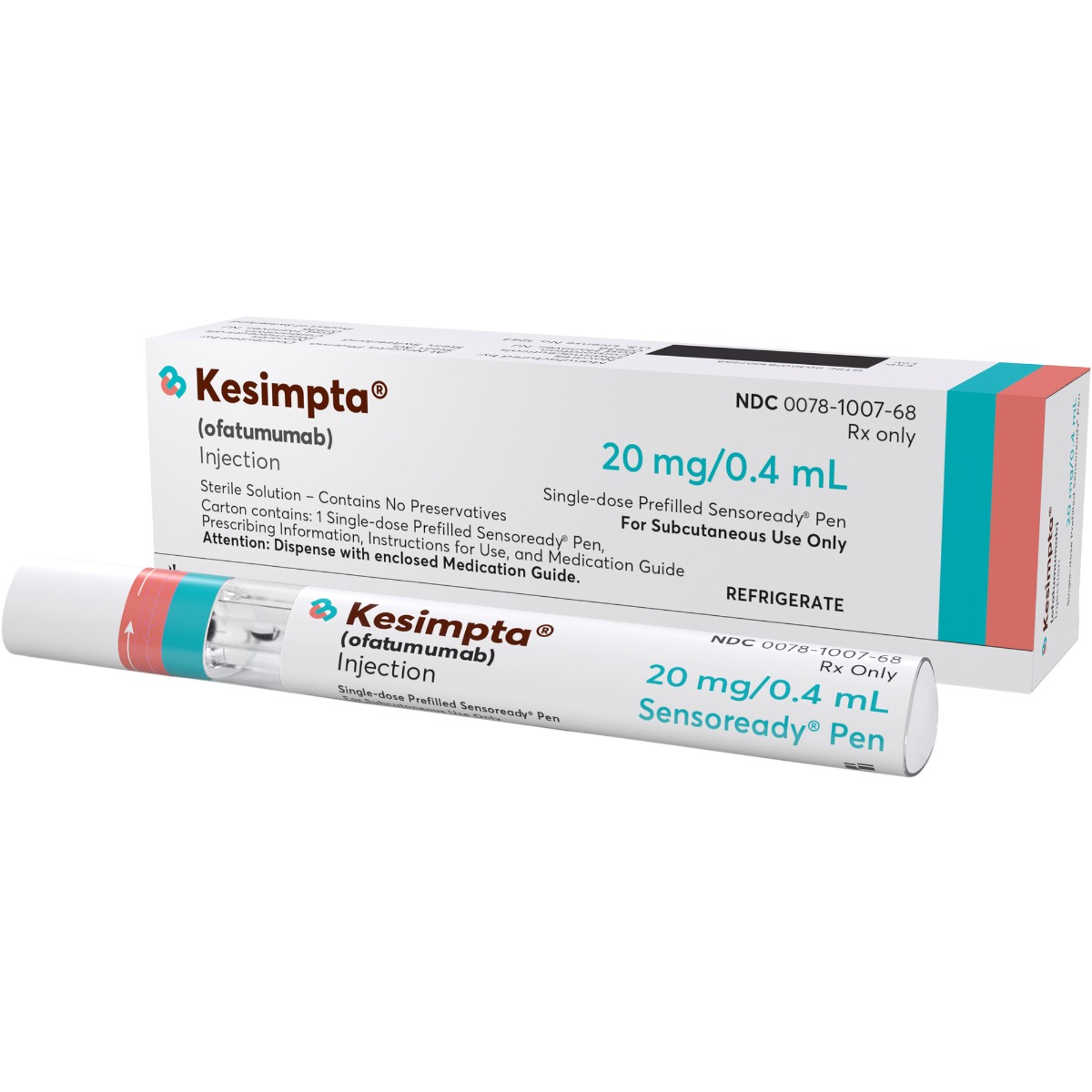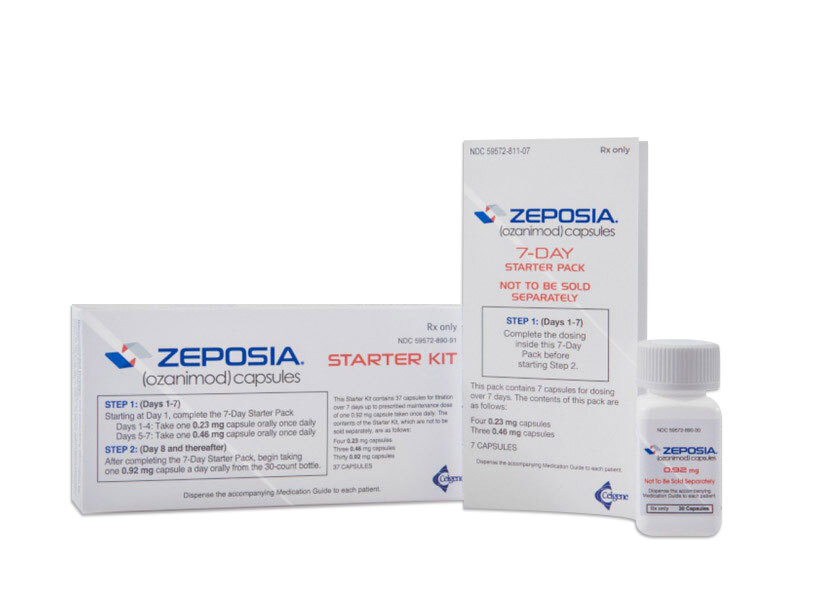Kesimpta (ofatumumab) vs Zeposia (ozanimod)
Kesimpta (ofatumumab) vs Zeposia (ozanimod)
Kesimpta (ofatumumab) is a CD20-directed cytolytic monoclonal antibody administered as a subcutaneous injection, primarily used for the treatment of relapsing forms of multiple sclerosis (MS), and works by targeting certain B cells that are thought to play a role in the neurological damage associated with MS. Zeposia (ozanimod) is an oral sphingosine 1-phosphate receptor modulator that traps certain white blood cells in lymph nodes, preventing them from entering the central nervous system, and is also approved for relapsing forms of MS. When deciding between Kesimpta and Zeposia, a patient should consider factors such as the route of administration (injection versus oral), the side effect profile, and any pre-existing conditions that may affect the choice of therapy, in consultation with their healthcare provider.
Difference between Kesimpta and Zeposia
| Metric | Kesimpta (ofatumumab) | Zeposia (ozanimod) |
|---|---|---|
| Generic name | Ofatumumab | Ozanimod |
| Indications | Relapsing forms of multiple sclerosis (MS), including clinically isolated syndrome, relapsing-remitting disease, and active secondary progressive disease in adults | Relapsing forms of multiple sclerosis (MS), including clinically isolated syndrome, relapsing-remitting disease, and active secondary progressive disease in adults |
| Mechanism of action | CD20-directed cytolytic antibody | Sphingosine 1-phosphate receptor modulator |
| Brand names | Kesimpta | Zeposia |
| Administrative route | Subcutaneous injection | Oral |
| Side effects | Upper respiratory tract infection, headache, injection-related reactions, and local injection site reactions | Upper respiratory infection, liver transaminase elevation, orthostatic hypotension, hypertension, and bradycardia |
| Contraindications | Patients with active hepatitis B virus infection, and those with hypersensitivity to ofatumumab or its excipients | Patients who in the last 6 months have had a myocardial infarction, unstable angina, stroke, transient ischemic attack, decompensated heart failure requiring hospitalization, or Class III/IV heart failure; patients with a history of hypersensitivity to ozanimod or any of its excipients |
| Drug class | Monoclonal antibody | Sphingosine 1-phosphate receptor modulator |
| Manufacturer | Novartis Pharmaceuticals Corporation | Bristol Myers Squibb |
Efficacy
Efficacy of Kesimpta (Ofatumumab) in Multiple Sclerosis
Kesimpta (ofatumumab) is a CD20-directed cytolytic monoclonal antibody that has been approved for the treatment of relapsing forms of multiple sclerosis (MS), which include clinically isolated syndrome, relapsing-remitting disease, and active secondary progressive disease in adults. Clinical trials have demonstrated the efficacy of Kesimpta in reducing the annualized relapse rate (ARR) compared to teriflunomide, a previously approved MS medication. In these pivotal trials, patients treated with Kesimpta showed a significant reduction in the number of relapses per year.
Additionally, Kesimpta has been shown to slow the progression of disability and reduce the number of new or enlarging brain lesions as seen on magnetic resonance imaging (MRI) scans, which are common markers of MS disease activity. The medication's efficacy in these areas suggests that it can help to manage the neurodegenerative aspects of MS and potentially improve long-term outcomes for patients.
Efficacy of Zeposia (Ozanimod) in Multiple Sclerosis
Zeposia (ozanimod) is an oral sphingosine 1-phosphate receptor modulator approved for the treatment of relapsing forms of multiple sclerosis, including clinically isolated syndrome, relapsing-remitting disease, and active secondary progressive disease in adults. Clinical studies have shown that Zeposia is effective in reducing the annualized relapse rate in comparison to interferon beta-1a, another MS therapy. Patients taking Zeposia experienced fewer relapses, indicating a robust efficacy in controlling disease activity.
Furthermore, Zeposia has demonstrated benefits in reducing the number of new or enlarging MRI-detected lesions and slowing the progression of disability associated with MS. Its efficacy in these clinical measures supports its role as a therapeutic option for managing the complex challenges of MS, with the added convenience of oral administration, which may improve patient adherence to treatment.
Regulatory Agency Approvals
Kesimpta
-
European Medical Agency (EMA), European Union

-
Food and Drug Administration (FDA), USA

Zeposia
-
European Medical Agency (EMA), European Union

-
Food and Drug Administration (FDA), USA

-
Health Canada

-
Therapeutic Goods Administration (TGA), Australia

Access Kesimpta or Zeposia today
If Kesimpta or Zeposia are not approved or available in your country (e.g. due to supply issues), you can access them via Everyone.org.
How it works

Make an enquiry
Choose the medicine you want to buy, answer a couple of questions, and upload your prescription to speed things up. We’ll get back to you within 24 hours.


Make an enquiry
Choose the medicine you want to buy, answer a couple of questions, and upload your prescription to speed things up. We’ll get back to you within 24 hours.


Breeze through the paperwork
We'll guide you through the required documents for importing unapproved medicine, ensuring you have all the necessary information.


Get a personalized quote
We’ll prepare a quote for you, including medicine costs and any shipping, administrative, or import fees that may apply.


Receive your medicine
Accept the quote and we’ll handle the rest - sourcing and safely delivering your medicine.

Some text on this page has been automatically generated. Speak to your physician before you start a new treatment or medication.
Let's talk
If you have any questions, call us or send us a message through WhatsApp or email:
Contact us




